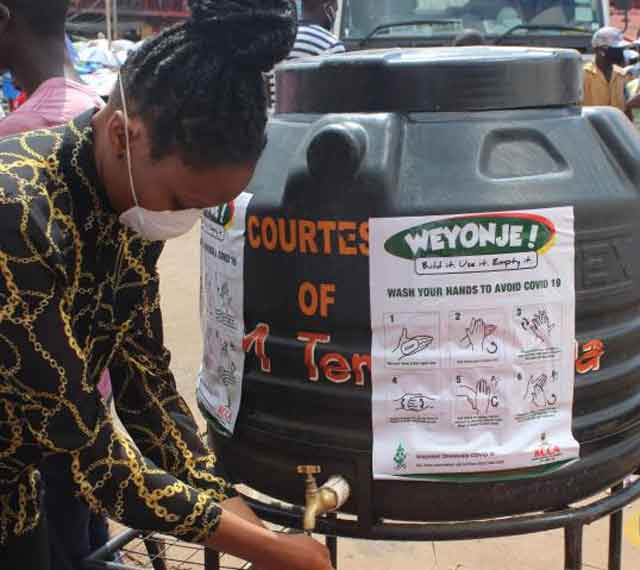
Kampala, Uganda | THE INDEPENDENT | More Ugandans are washing hands with soap than before. New data from Twaweza’s Sauti za Wananchisurvey says access to hand washing facilities with either water or soap has increased remarkably in most parts of 2020 compared to last last year.
The increase ins hand washing could be linked to awareness messages promoting hand washing as a preventive measure against COVID19.
Most citizens cite handwashing or the use of sanitiser (87%) as one way of protecting themselves and others from infection, more than any other method. This is followed by staying at home (72%) and maintaining distance from those with symptoms (49%). A smaller number mentioned the need to avoid touching the face (26%). These are all cited by more Ugandans in July than in April.
Data from the survey released as Uganda joins the global handwashing day indicates that eight out of ten households (83%) report they have handwashing facilities with soap close to their toilet facility.
Global Handwashing Day is October 15. And as every year, the day offers as a platform to raise global awareness on the importance of hand-washing with soap.
These figures according to the survey are largely consistent across urban and rural areas and between wealthier and poorer households.
Access to handwashing facilities with either water or soap has increased markedly since 2019. The health Ministry has in the past three years been battling to increase the hand washing practices in effort to fight infectious disease most of which are due to poor hygiene.
Handwashing practices had before the outbreak of COVID19 pandemic declined in some of the districts according to the Ministry of health 2018 report. The COVID-19 pandemic provides a stark reminder that hand-washing is one of the simplest ways to prevent the spread of any virus and ensure better health outcomes overall.
This year’s Global Handwashing Day theme is Hand Hygiene for All, calling for all of society to achieve universal hand hygiene now and for the future.
Dr. Monica Musenero Masanza, an epidemiologist and Senior Presidential says the pandemic has highlighted the critical role of hand hygiene in disease prevention. She says while many are recommending the use of hand sanitizers, hand handwashing with soap is equally effective in preventing COVID19 virus and other infections.
“If you have hand sanitizer you can use but soap is quite useful. Just soap and running water. Actually for me as an epidemiologist dealing with large populations apart from healthcare and then cleaning the desks, for hand washing, soap. The moment you can wash your hands properly” she sad
The Twaweza survey however finds that says the wealthier (37%) and urban (44%) households are considerably more likely to have access to running water from a tap than poorer (13%) and rural households (15%).
Players in the water and sanitation sector (UWASNET) have been calling on the government to close the inequality gap between the rural and urban Uganda.
Jeremiah Nyaga, a Program Director for World Vision recently told Uganda Radio Network in an interview said the inequality between the rich and the poor can be an impediment in improving handwashing as a hygiene issue.
“Yes Uganda has water but it is not accessed in the same way. The data is also saying the rich have piped water have money. They are able to access water but the poor people and the people who are having the brunt of this inequality are women” said Nyaga
The most widely-cited circumstances in which citizens wash their hands with soap are after using the toilet (84%), before and after eating (72%), when their hands look or feel dirty (65%) and after returning home from outside (63%). These are all cited by more Ugandans in July than in April.
In Kampala, Kyotera and Tororo, according to the survey most citizens report washing their hands at critical times.
Across these three districts, the most common occasions on which people report washing their hands with soap are after using the toilet, before and after eating, after returning home from outside and when their hands look or feel dirty.
Citizens cite handwashing as the best way of protecting themselves and others from the Coronavirus Most citizens cite handwashing or the use of sanitiser (87%) as one way of protecting themselves and others from infection, more than any other method.
This is followed by staying at home (72%) and maintaining distance from those with symptoms (49%). A smaller number mentioned the need to avoid touching the face (26%).
********
URN
 The Independent Uganda: You get the Truth we Pay the Price
The Independent Uganda: You get the Truth we Pay the Price





